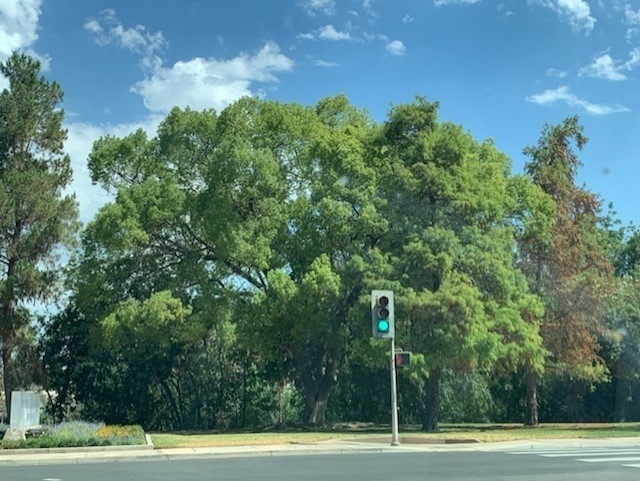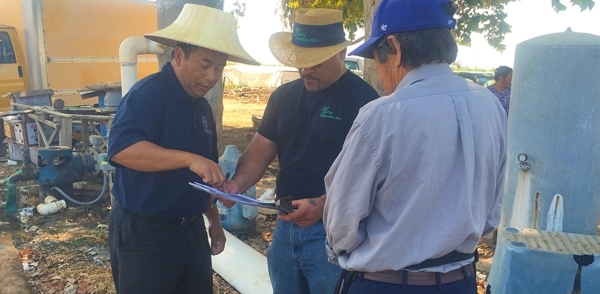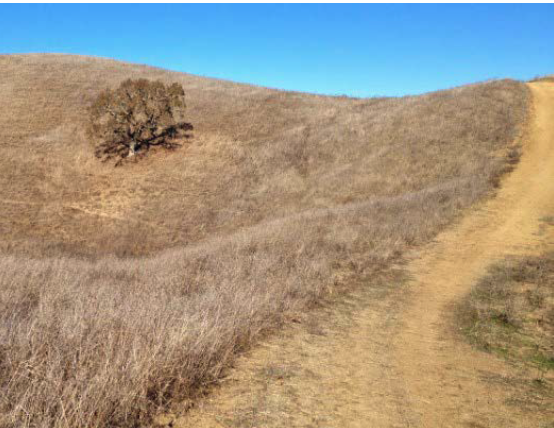Posts Tagged: urban agriculture
Lawn-pocalypse! Surviving Drought
Ah, summer! The season of sunburns, pool parties, and… lawn droughts. If your once lush, green carpet now looks like a crunchy brown doormat, you're not alone. Let's dive into why your yard is staging a dramatic death scene and what you can do to...

Bermuda grass and weeds overtaking drought stressed turf grass.
Tips on care of backyard chickens, sheep, goats compiled on new website
UC Cooperative Extension expertise available in English and Spanish on small-scale livestock production, pasture management, pests and predators, weed management and emergency preparedness
A team of University of California Agriculture and Natural Resources advisors has created a new comprehensive website for small acreage landowners in California and beyond. The Small Acreage Landowners website, at https://ucanr.edu/sites/smacreage, is designed to be a one-stop shop for backyard livestock producers, youth raising livestock, and other small acreage landowners. Information on livestock husbandry, pasture management, pests and predators, weed management and emergency preparedness is in English and Spanish on the website.
“We've seen an amazing growth in interest in small-scale livestock production throughout California in the last four years,” said project leader Julie Finzel, UC Cooperative Extension livestock and natural resources advisor for Kern, Tulare and Kings Counties. “Folks in our communities are hungry for knowledge about how to care for their land and their animals – from urban chickens to backyard goats and sheep.”
The website includes specific information for most common livestock species, as well as links to sites with more in-depth information about specific topics. Other pages include information on protecting livestock and property from pests and predators, controlling common weeds and protecting water quality.
The site also provides links to a variety of other UC ANR resources, including wildfire information from the Fire Network, and videos and webinars from the UC ANR Managing Land & Livestock on Small Acreage Webinar Series.
“We're excited this new website will make science-based information available to a wider audience,” said Finzel. “Most of our educational programming has focused on commercial livestock production.”
In addition to Finzel, a team of UC Cooperative Extension livestock advisors contributed to the project, including Theresa Becchetti (Stanislaus and San Joaquin counties), Brooke Latack (Imperial, Riverside and San Bernadino counties) Dan Macon (Placer, Nevada, Sutter and Yuba counties), Devii Rao (San Benito, Santa Cruz and Monterey counties), Rebecca Ozeran, former UC Cooperative Extension livestock advisor for Fresno and Madera counties and Flavie Audoin, former UCCE advisor for the Central Sierra now rangeland management extension specialist at University of Arizona. UC ANR technician Sequoia Williams in Placer County compiled information and designed the webpages.
The Small Acreage Landowners website was created in part with funds from a USDA-NIFA Renewable Resources Extension Act grant.
Updated March 6, 2024, to add Flavie Audoin as a contributor to the website.
UC offers resources for urban farmers at EcoFarm
University of California scientists will be participating in the 44th Annual EcoFarm Conference Jan. 17-20 in Pacific Grove. EcoFarm participants gather to celebrate and learn about advances in farming and food systems throughout the state. This year, the three-day conference will highlight Black, Indigenous and People of Color communities that depend on agriculture, while also showcasing the new technological advances that further the development of agriculture.
Researchers from the UC Davis Veterinary Teaching Hospital's Department of Population Health, the Western Institute of Food Safety and Security and UC Agriculture and Natural Resources will be attending the conference to highlight the importance of food safety and technical skills in urban farming.
At EcoFarm, the Western Institute of Food Safety and Security will showcase its Civic Urban Farmer Program with an exhibit. The program, led by UC Davis assistant project scientist Sara Garcia and supported by UC Cooperative Extension, strives to uplift BIPOC communities.
The Civic Urban Farmer Program
The Civic Urban Farmer Program – a no-cost, 11-week program for farmers in the Sacramento region and Bay Area – provides technical support for new and upcoming urban farmers through webinars and in-person events. The program is available for any race, gender, age and skill ability, and seeks to provide safe, expert advice for farmers at any scale.
Soil health, composting, pest management, business marketing, food safety and urban policy are among the topics covered in its lecture-style classes.
Earlier this year, the program graduated its second cohort, with the support of two nonprofit organizations, Three Sisters Gardens in West Sacramento and Common Vision in Oakland. The program is supported by industry professionals, researchers and government officials, as well as local nonprofit and non-governmental organizations.
Elina Niño, UC Cooperative Extension specialist in apiculture, joined the Civic Urban Farmer Program to support urban farmers with training on managing pollinators to increase crop yields and create value-added products such as honey. The success of the pollinator program revealed that small urban farmers desire resources and education that are tailored specifically toward the cultivation of healthy and safe food.
For more information about the Civic Urban Farmer Program, visit https://www.wifss.ucdavis.edu/urbanfarmers.
Organic Agriculture Institute
The UC Organic Agriculture Institute, led by UC Cooperative Extension specialist Houston Wilson, will have an exhibit at EcoFarm. UC Organic Agriculture Institute brings together growers, certifiers, consultants, community groups and other stakeholders with UC research and extension personnel to share information about organic farming.
For more information about the UC Organic Agriculture Institute, visit https://organic.ucanr.edu.
Workshop speakers
Several UC Cooperative Extension advisors will be speaking at EcoFarm, including Richard Smith, UCCE emeritus vegetable crops advisor; Patricia Lazicki, UCCE vegetable crops advisor; and Margaret Lloyd, UCCE small farms advisor.
Connect with @ucanr on X, Instagram and LinkedIn.
Climate-Change Resources
University of California UC ANR Green Blog (Climate Change and Other Topics) https://ucanr.edu/blogs/Green/index.cfm?tagname=climate%20change (full index)
Examples:
- Save Trees First: Tips to Keep Them Alive Under Drought https://ucanr.edu/b/~CdD
- Landscaping with Fire Exposure in Mind: https://ucanr.edu/b/~G4D
- Cities in California Inland Areas Must Make Street Tree Changes to adapt to Future Climate https://ucanr.edu/b/~oF7
Drought, Climate Change and California Water Management Ted Grantham, UC Cooperative Extension specialist (23 minutes) https://youtu.be/dlimj75Wn9Q
Climate Variability and Change: Trends and Impacts on CA Agriculture Tapan Pathak, UC Cooperative Extension specialist (24 minutes) https://youtu.be/bIHI0yqqQJc
California Institute for Water Resources (links to blogs, talks, podcasts, water experts, etc.) https://ciwr.ucanr.edu/California_Drought_Expertise/
UC ANR Wildfire Resources (publications, videos, etc.) https://ucanr.edu/News/For_the_media/Press_kits/Wildfire/ (main website)
-UC ANR Fire Resources and Information https://ucanr.edu/sites/fire/ (main website)
-Preparing Home Landscaping https://ucanr.edu/sites/fire/Prepare/Landscaping/
UC ANR Free Publications https://anrcatalog.ucanr.edu/ (main website)
- Benefits of Plants to Humans and Urban Ecosystems: https://anrcatalog.ucanr.edu/pdf/8726.pdf
-Keeping Plants Alive Under Drought and Water Restrictions (English version) https://anrcatalog.ucanr.edu/pdf/8553.pdf
(Spanish version) https://anrcatalog.ucanr.edu/pdf/8628.pdf
- Use of Graywater in Urban Landscapes https://anrcatalog.ucanr.edu/pdf/8536.pdf
- Sustainable Landscaping in California https://anrcatalog.ucanr.edu/pdf/8504.pdf
Other (Non-UC) Climate Change Resources
Urban Forests and Climate Change. Urban forests play an important role in climate change mitigation and adaptation. Active stewardship of a community's forestry assets can strengthen local resilience to climate change while creating more sustainable and desirable places to live. https://www.fs.usda.gov/ccrc/topics/urban-forests
Examining the Viability of Planting Trees to Mitigate Climate Change (plausible at the forest level) https://climate.nasa.gov/news/2927/examining-the-viability-of-planting-trees-to-help-mitigate-climate-change/
Reports and other information resources coordinated under the auspices of the United Nations and produced through the collaboration of thousands of international scientists to provide a clear and up to date view of the current state of scientific knowledge relevant to climate change. United Nations Climate Action
Scientific reports, programs, action movements and events related to climate change. National Center for Atmospheric Research (National Science Foundation)
Find useful reports, program information and other documents resulting from federally funded research and development into the behavior of the atmosphere and related physical, biological and social systems. Search and find climate data from prehistory through to an hour ago in the world's largest climate data archive. (Formerly the "Climatic Data Center") National Centers for Environmental Information (NOAA)
Think tank providing information, analysis, policy and solution development for addressing climate change and energy issues (formerly known as the: "Pew Center on Global Climate Change"). Center for Climate & Energy Solutions (C2ES)
Mapping Resilience: A Blueprint for Thriving in the Face of Climate Disaster. The Climate Adaptation Knowledge Exchange (CAKE) was launched in July 2010 and is managed by EcoAdapt, a non-profit with a singular mission: to create a robust future in the face of climate change by bringing together diverse players to reshape planning and management in response to rapid climate change. https://www.cakex.org/documents/mapping-resilience-blueprint-thriving-face-climate-disaster
Cal-Adapt provides a way to explore peer-reviewed data that portrays how climate change might affect California at the state and local level. We make this data available through downloads, visualizations, and the Cal-Adapt API for your research, outreach, and adaptation planning needs. Cal-Adapt is a collaboration between state agency funding programs, university and private sector researchers https://cal-adapt.org/
Find reports, maps, data and other resources produced through a confederation of the research arms of 13 Federal departments and agencies that carry out research and develop and maintain capabilities that support the Nation's response to global change. Global Change (U.S. Global Change Research Program)
The Pacific Institute is a global water think tank that combines science-based thought leadership with active outreach to influence local, national, and international efforts to develop sustainable water policies. https://pacinst.org/our-approach/
Making equity real in climate adaptation and community resilience policies and programs: a guidebook. https://greenlining.org/publications/2019/making-equity-real-in-climate-adaption-and-community-resilience-policies-and-programs-a-guidebook/
Quarterly CA Climate Updates and CA Drought Monitor Maps (updated each Thursday) https://www.drought.gov/documents/quarterly-climate-impacts-and-outlook-western-region-june-2022
Drought focus of Water Resources IMPACT magazine special issue
UC ANR experts address emotional toll of drought
Preparing the American West for prolonged drought is the focus of a double issue of Water Resources IMPACT magazine. The California Water Commission staff are guest editors for this special open-access edition of the magazine, which is published by the American Water Resources Association.
Faith Kearns, academic coordinator of University of California Agriculture and Natural Resources' California Institute for Water Resources, is among the authors delving into how drought impacts people and the environment and how we can better prepare for the inevitable.
The first issue, published on Feb. 14, focuses on water scarcity issues confronting California and the ways these issues affect different sectors.
In “Trauma, Care, and Solidarity: Addressing the Emotional Toll of Chronic Drought,” Kearns highlights the effects of drought on mental health. She points to the spike in suicide hotline calls when wells ran dry in Southeast Asian communities in California's Central Valley.
By listening to Southeast Asian farmers, Ruth Dahlquist-Willard and Michael Yang of UC Cooperative Extension were able to “lighten the load” for them by providing pragmatic support, Kearns writes.
“The scale of some of these highly emotional issues – drought, wildfires, climate change – can make them seem incredibly difficult, if not impossible, to deal with,” Kearns said. “At the same time, they are affecting everyone living in the western U.S. on a daily basis. I wanted to highlight and provide models based on work that people – whether they are researchers, clinical psychologists, or Cooperative Extension advisors – are doing right now to ease the way.”
The authors who contributed to the double issue are a diverse array of Tribal experts, academics, nongovernmental organization thought-leaders, water managers and water policy influencers, each of whom brings their own perspective on the topic of drought. Their expertise and perspectives in climate science, water policy and water management will help inform drought-related decision-making and support policies that better prepare the state to thrive during periods of prolonged water scarcity.
In addition to Kearns, the first issue includes articles contributed by:
- Samantha Stevenson, University of California, Santa Barbara
- Jay Lund, University of California, Davis
- Ron Goode, North Fork Mono Tribe
- Andy Fecko, Placer County Water Agency
- Jeff Mount, Public Policy Institute of California, and Ted Grantham, University of California, Berkeley/UC Cooperative Extension
- Nat Seavy and Karyn Stockdale, National Audubon Society
- Kjia Rivers, Community Water Center
- Cannon Michael, Bowles Farming
- Michelle Reimers, Turlock Irrigation District
The January/February edition of Water Resources IMPACT magazine can be accessed, free of charge, on the American Water Resources Association website at https://www.awra.org under “Publications.”
The second issue, to be published in March, will focus on drought response, considering the options for adaptation. This two-part series complements the Commission's work on strategies to protect communities and fish and wildlife in the event of a long-term drought.









